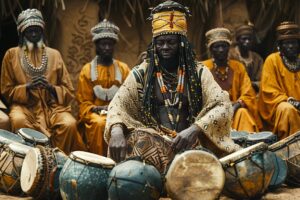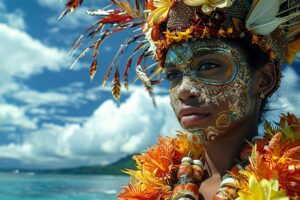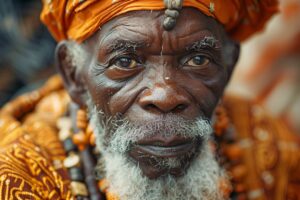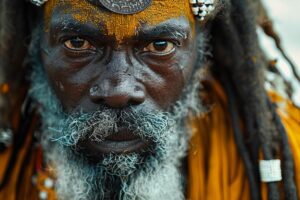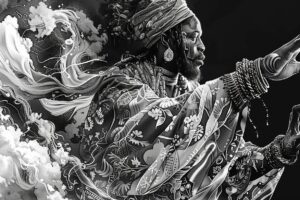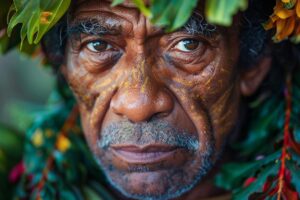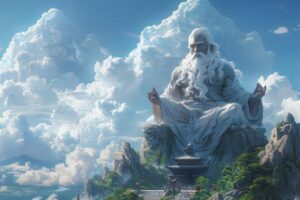Fijian Mythology: Gods, Legends, and Practices
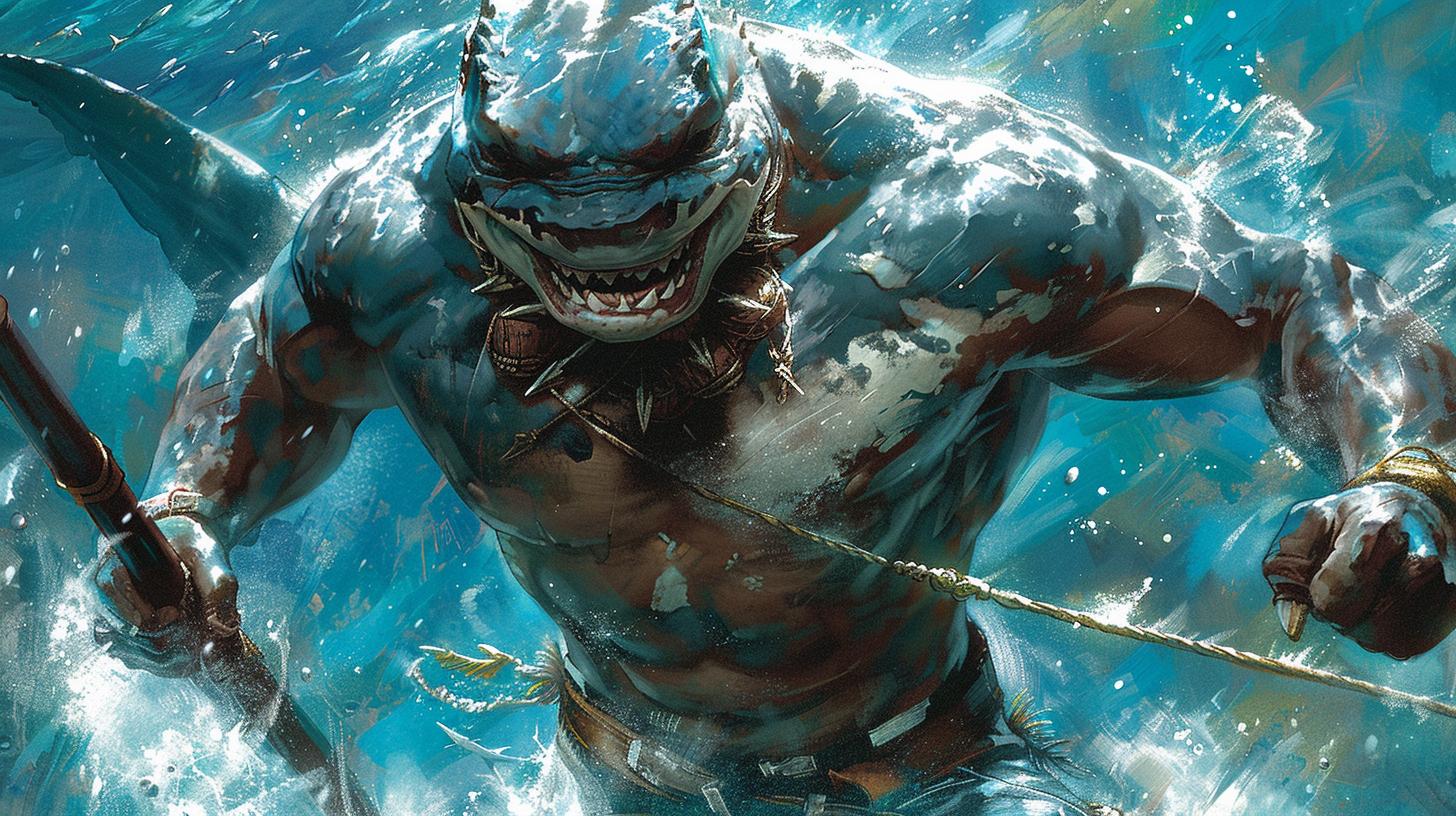
In Fijian Mythology, Degei is the supreme serpent god, creator of the world and mankind. Degei’s judgement of souls and control over nature play a vital role in Fijian culture.
Additionally, other deities like Dakuwaqa, Nangananga, and Ratumaibulu contribute to the rich tapestry of Fijian mythological beliefs and practices. Introduced religions have also left a lasting impact on Fijian spirituality.
Origins of Fijian Mythology
Fijian Mythology traces its origins to the divine being known as Degei.
According to legend, Degei is the creator of the world, the fruits, and mankind. His role as the supreme god in Fijian mythology is central to understanding the cultural beliefs and practices of the Fijian people.
Creation of the World by Degei
Degei is credited with the creation of the world, the plants, and the first humans. It is said that Degei’s actions brought forth life and fertility to the land of Fiji, shaping the natural world as we know it today.
Through his divine powers, Degei set the stage for the rich mythology that defines Fijian culture.
Degei as the Supreme God
Degei holds a position of unparalleled importance in Fijian mythology as the supreme god. His status as the creator of all things and the ultimate judge of souls underscores his role as a powerful deity in the Fijian pantheon.
The reverence and awe in which Degei is held by the Fijian people reflect his divine attributes and influence.
The Role of Degei in Fijian Culture
Degei’s influence extends beyond the realm of creation and judgement. He is also seen as a deity who governs natural phenomena such as earthquakes, storms, and seasonal changes. The Fijian people look to Degei for blessings of rain, bountiful harvests, and protection from his wrath.
Stories of Degei’s power and unpredictability serve as a reminder of his significance in shaping both the physical and spiritual worlds of Fiji.
Degei: The Serpent God
Degei, the serpent god, holds a significant role in Fijian mythology. His transformation into a serpent marked a pivotal moment in the mythology, shaping his powers, attributes, and influence on nature.
Degei’s Transformation to a Serpent
The transformation of Degei into a serpent symbolizes his connection to the earth and the natural world. His serpentine form became synonymous with power and divinity, solidifying his place as a central deity in Fijian folklore.
Degei’s Powers and Attributes
- Degei possesses immense powers over creation and destruction, reflecting his status as the supreme god in Fijian mythology.
- His attributes include control over natural phenomena such as earthquakes, storms, and seasonal changes, showcasing his authority over the elements.
- Degei’s serpentine nature imbues him with wisdom, cunning, and a keen sense of justice, shaping his interactions with mortals and other deities.
Degei’s Influence on Nature
Degei’s influence on nature is profound, as his movements and actions dictate the fertility of the land and the prosperity of the people.
When Degei stirs, rainfall nourishes the earth, fruits ripen on trees, and crops thrive in the fields.
Fijian Mythological Deities
In Fijian mythology, various deities play important roles in the cultural beliefs and practices. Let’s explore some of the key mythological figures:
Dakuwaqa: The Shark God
Dakuwaqa is revered as a powerful deity associated with the sea and sharks. He is believed to protect fishermen and ensure successful voyages. Some myths depict Dakuwaqa as a shape-shifting creature, emphasizing his mystical and unpredictable nature.
Nangananga: The Goddess of the Dead
Nangananga holds a significant role as the ruler of the afterlife and guardian of departed souls. In Fijian beliefs, she guides the spirits of the deceased to their final resting place and oversees their journey into the spiritual realm.
Her presence symbolizes the cycle of life and death.
Ratumaibulu: The Serpent God
Ratumaibulu is a serpent deity associated with nature, fertility, and transformation. In Fijian mythology, he is often depicted as a wise and enigmatic figure, representing the balance between creation and destruction.
Ratumaibulu’s presence in folklore underscores the interconnectedness of all living beings.
Traditional Practices and Beliefs
Traditional practices and beliefs play a significant role in Fijian Mythology, reflecting the spiritual connection of the Fijian people with their ancient traditions and deities.
Animism and Shamanism in Fijian Mythology
Animism and Shamanism are integral parts of Fijian Mythology, where spirits are believed to reside in objects and natural elements.
Shamans hold a special role in mediating between the physical and spiritual worlds, performing rituals to maintain harmony with the divine forces.
Tattoos in Fijian Mythology
Tattoos hold deep cultural and spiritual significance in Fijian Mythology, symbolizing status, protection, and connection to ancestral spirits. The intricate designs and placement of tattoos convey a person’s identity, lineage, and spiritual beliefs, serving as a visible representation of their connection to the spiritual realm.
Cult of the Serpents
The cult of the serpents is a sacred tradition in Fijian Mythology, revering serpents as symbols of power, wisdom, and transformation. Serpents are seen as divine messengers, intermediaries between the earthly and spiritual realms, with rituals and offerings dedicated to these revered creatures to seek their protection and blessings.
Influence of Introduced Religions
The arrival of Christianity in Fiji had a profound impact on the traditional spiritual beliefs of the Fijian people, introducing new religious practices and beliefs. Alongside Christianity, Islam and Hinduism also found their way to the islands, further diversifying the religious landscape of Fiji.
Impact of Christianity in Fiji
Christian missionaries played a significant role in the spread of Christianity across the islands, influencing many aspects of Fijian society. Churches were established, and Christian teachings began to shape the moral and ethical values of the people.
Arrival of Islam and Hinduism
In later years, the arrival of Islam and Hinduism introduced new religious practices to Fiji. The influx of Indian laborers brought these religions to the islands, creating a blend of spiritual traditions that coexist with the existing Fijian mythological beliefs.
Spiritual Consultations and Practices
Despite the introduction of these new religions, traditional Fijian spiritual practices such as spiritual consultations continued to hold significance. Methods such as using objects like garrote of war or shells for predicting the future were practiced cautiously, reflecting a blend of old and new spiritual beliefs.
Legacy of Fijian Mythology
The legacy of Fijian Mythology is deeply ingrained in the cultural fabric of Fiji and continues to captivate both locals and visitors alike. Let’s explore the enduring fascination with Degei and other deities, the preservation of mythological traditions, and the evolution of spiritual beliefs in Fiji.
Continued Fascination with Degei and Other Deities
- Degei, the serpent god and creator of the world, remains a prominent figure in Fijian mythology, revered for his role in shaping the universe.
- Other deities like Dakuwaqa, Nangananga, and Ratumaibulu also hold a special place in Fijian folklore, with their stories passed down through generations.
- The tales of these mythological beings continue to enthrall audiences, showcasing the enduring allure of Fijian spirituality.
Preservation of Fijian Mythological Traditions
- Fijian communities take great pride in preserving their mythological traditions, ensuring that the stories of Degei and other deities are upheld and respected.
- Cultural practices and rituals associated with Fijian mythology, such as the cult of the serpents and tattooing, are safeguarded as integral parts of the island nation’s heritage.
- Through oral traditions and artistic expressions, Fijians pass down the mythological legacy to future generations, keeping the ancient beliefs alive and relevant.
Evolution of Fijian Spiritual Beliefs
- While rooted in traditional mythology, Fijian spiritual beliefs have evolved over time, influenced by introduced religions like Christianity, Islam, and Hinduism.
- The syncretism of these diverse faiths has contributed to a dynamic spiritual landscape in Fiji, where different religious practices coexist with traditional mythological customs.
- The evolution of spiritual beliefs reflects the adaptive nature of Fijian culture, embracing new influences while retaining a strong connection to the ancient myths that shape their identity.













